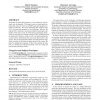Free Online Productivity Tools
i2Speak
i2Symbol
i2OCR
iTex2Img
iWeb2Print
iWeb2Shot
i2Type
iPdf2Split
iPdf2Merge
i2Bopomofo
i2Arabic
i2Style
i2Image
i2PDF
iLatex2Rtf
Sci2ools
108
click to vote
ATAL
2010
Springer
2010
Springer
Reasoning about strategies of multi-agent programs
Verification of multi-agent programs is a key problem in agent research and development. This paper focuses on multi-agent programs that consist of a finite set of BDI-based agent programs executed concurrently. We choose alternating-time temporal logic (ATL) for expressing properties of such programs. However, the original ATL is based on a synchronous model of multi-agent computation while most (if not all) multi-agent programming frameworks use asynchronous semantics where activities of different agents are interleaved. Moreover, unlike in ATL, our agent programs do not have perfect information about the current global state of the system. They are not appropriate subjects for modal epistemic logic either (since they do not know the global model of the system). We begin by adapting the semantics of ATL to the situation at hand; then, we consider the verification problem in the new setting and present some preliminary results. Categories and Subject Descriptors I.2.5 [Artificial Int...
Artificial Intelligence | ATAL 2010 | Intelligent Agents | Multi-agent Programming Frameworks | Multi-agent Programs |
Related Content
| Added | 08 Nov 2010 |
| Updated | 08 Nov 2010 |
| Type | Conference |
| Year | 2010 |
| Where | ATAL |
| Authors | Mehdi Dastani, Wojciech Jamroga |
Comments (0)

